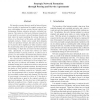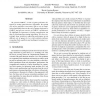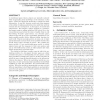224 search results - page 34 / 45 » On Nash-Equilibria of Approximation-Stable Games |
FOCS
2006
IEEE
14 years 1 months ago
2006
IEEE
We introduce a game theoretic model of network formation in an effort to understand the complex system of business relationships between various Internet entities (e.g., Autonomou...
FOCS
2007
IEEE
14 years 1 months ago
2007
IEEE
We present efficient approximation algorithms for finding Nash equilibria in anonymous games, that is, games in which the players utilities, though different, do not differentia...
ATAL
2004
Springer
14 years 27 days ago
2004
Springer
We present GAMUT1 , a suite of game generators designed for testing game-theoretic algorithms. We explain why such a generator is necessary, offer a way of visualizing relationshi...
CORR
2008
Springer
13 years 7 months ago
2008
Springer
Abstract--This paper considers the noncooperative maximization of mutual information in the vector Gaussian interference channel in a fully distributed fashion via game theory. Thi...
SIGECOM
2006
ACM
14 years 1 months ago
2006
ACM
In traditional game theory, players are typically endowed with exogenously given knowledge of the structure of the game—either full omniscient knowledge or partial but fixed in...



